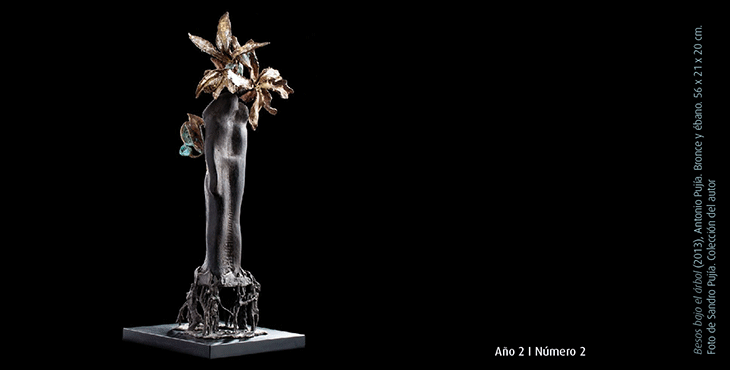It Was What Started Once Which Later Ceased to Be. Musical Promotion and Cultural Dependence in Latin America
DOI:
https://doi.org/10.24215/25457888e004Keywords:
Musical associations, musical diplomacy, dependenceAbstract
In Latin America, since the 19th century, organized and/or institutionalizedmusical promotion has pointed to cultural dependence as a problem to besolved, although modifying the metropolitan center identified as dominating.At the same time, these associations were characterized by the discontinuityof their tasks, a difficulty related to the previous problem. In order to fightagainst the delay of local musicians, associations and foundations organizedfestivals, concerts, conferences and higher education courses on music. Theiractions are intertwined with international cultural policies and diplomaciesthat, around music, operate under different social models. This work analyzesthe constants of the music promoting associations in Latin America.Downloads
References
Aharonián, C. (2004). ¿Seguir? En Educación, Arte, Música (pp. 139-145). Montevideo, Uruguay: Tacuabé.
Bourdieu, P. [1966] (2002). Campo de poder, campo intelectual. Itinerario de un concepto. Buenos Aires, Argentina: Montressor.
Brower, L. (1982). La música, lo cubano y la innovación. La Habana, Cuba: Letras cubanas.
Bueno, G. (2016). El mito de la cultura. Oviedo, España: Pentalfa.
Cannova, M. P. (2016). El interés de la ayuda. Política cultural norteamericana, filantropía e innovación musical en Latinoamérica entre 1960-1970. En Actas de las XXII Conferencia de la Asociación Argentina de Musicología y XVIII Jornadas de Musicología del Instituto Nacional de Musicología. Instituto Nacional de Musicología, Santa Fe, Argentina.
Cáceres, E. (julio-diciembre de 1989). Los Cursos Latinoamericanos de Música Contemporánea. Una alternativa diferente. Musical Chilena, XLIII (172), 46-84.
Carpentier, A. (1980). La música en Cuba. Ciudad de México, México: Fondo de cultura económica.
Corrado, O. (2010). Música y modernidad en Buenos Aires (1920-1940). Ciudad Autónoma de Buenos Aires, Argentina: Gourmet.
Eli, V. (2010). Las sociedades artístico musicales. En C. Carredaño y V. Eli (Eds.), Historia de la música en España e Hispanoamérica. La música en Hispanoamérica en el siglo XIX (pp. 267-304). Madrid, España: Fondo de Cultura Económica.
Etkin, M. J. (1972). Reflexiones sobre la música de vanguardia en América Latina. La Opinión, p. 12.
Fosler- Lussier, D. (2015). Music in America´s Cold War Diplomacy. California, Estados Unidos: University of California Press.
Garramuño, F. (2007). Modernidades primitivas. Tango, samba y nación. Buenos Aires, Argentina: Fondo de Cultura Económica.
Gianera, P. (2011). Moderismo y vanguardia. En VV.AA., La música en el Di Tella: Resonancias de la modernidad (pp. 42-45). Ciudad Autónoma de Buenos Aires, Argentina: Secretaría de Cultura de la Nación.
Herrera, E. (2011). Perspectiva Internacional: Lo «latinoamericano» del Centro Latinoamericano de Altos Estudios Musicales. En VV.AA., La música en el Di Tella: Resonancias de la modernidad (pp. 30-35). Ciudad Autónoma de Buenos Aires, Argentina: Secretaría de Cultura de la Nación.
Holland, H. (1975). La nueva música llega a Latinoamérica. Boletín Musical/Sociedad Venezolana de Música Contemporánea, (1).
Malán Carrera, F. (2015). Los primeros veinte años de música electroacústica en Uruguay. Boletín Música, (41), 123-139.
Meierovich, C. (2010). Enseñanza, crítica y publicaciones periódicas. En C. Carredaño y V. Eli (eds.), Historia de la música en España y Latinoamérica (pp. 323-366). Madrid, España: Fondo de Cultura Económica.
Miranda, E. (2011). La identidad constructora. Sociedades y conservatorios nacionales. En M. de Vega Armijo (coord.), La búsqueda perpetua: lo propio y lo universal de la cultura latinoamericana (pp. 53-68). Ciudad de México, México: Secretaría de Relaciones Exteriores. Dirección General del Acervo Histórico Diplomático.
Paraskevaídis, G. (2013/2014). Cursos latinoamericanos de música contemporánea. Recuperado de https://www.latinoamerica-musica.net/
Payne, A. (2006). Creating Music of the Americas in the Cold War: Alberto Ginastera and the Inter-American Music Festivals (Tesis de maestría). Ohio, Estados Unidos: Bowling Green State University.
Rockefeller Foundation (1963). Annual Report for 1962. Recuperado de https://assets.rockefellerfoundation.org/app/uploads/20150530122229/Annual-Report-1962.pdf
Vázquez, H. (2014). Conversaciones en torno al CLAEM: entrevistas a compositores becarios del Centro Latinoamericano de Altos Estudios Musicales del Instituto Di Tella. Ciudad Autónoma de Buenos Aires, Argentina: Instituto Nacional de Musicología.
Downloads
Published
How to Cite
Issue
Section
License
Current policy since 2019
The acceptance of the manuscript by the magazine means the non-exclusive cession of the property rights of the authors in favour of the editor, who allows the reuse, after publication (post print), under a license Attribution-NonCommercial-ShareAlikes 4.0 International (BY-NC-SA 4.0).
According to these terms, the material can be copied and redistributed by any means or in any format as long as a) the author and original source of the publication are quoted (magazine and URL of the work), access to the license is provided and whether changes have been made is mentioned; and b) the material is not used for commercial purposes.
The cession of non-exclusive rights means that after the publication (post print) in Armiliar the authors can publish their work in any language, means and format; in such cases it must be mentioned that the material was originally published in this magazine. Such cession also means the authorization of the authors for the work to be collected by SEDICI, the institutional archive of the Universidad Nacional de La Plata, and to be spread in the databases that the editorial team considers appropriate to increase the visibility of the publication and its authors.
Moreover, the magazine encourages the authors to deposit their productions in other institutional and thematic archives under the principle that offering the society the scientific and academic production without any restrictions contributes to a greater exchange of the global knowledge.



























